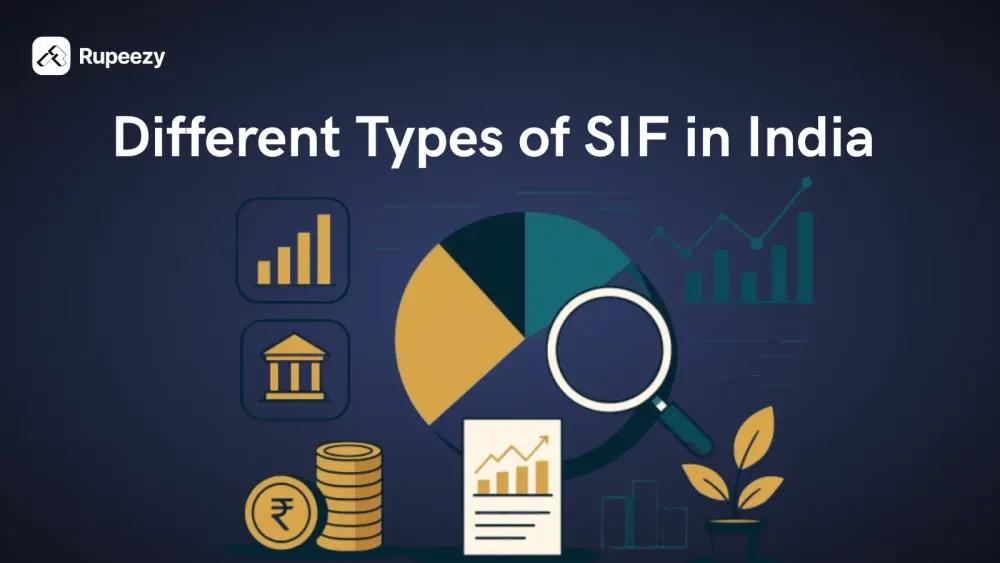Different Types of SIF in India Complete Overview


00:00 / 00:00
Investors today no longer want to be limited to just equity and debt funds. They are now looking for options that offer better diversification, smart strategies, and professional management which is why Specialized Investment Funds (SIFs) are becoming increasingly popular. In India, HNIs, family offices, and institutional investors are using SIFs to gain exposure to diverse sectors and alternative investments. In this blog, we'll explore the different types of SIFs, how they work, and why their demand is growing.
What Are Specialised Investment Funds (SIFs)?
Specialized Investment Funds (SIFs) are regulated investment vehicles that pool the funds of many investors and invest them professionally in niche and alternative asset classes. These may include specialized sectors such as hedge funds, private equity, real estate, and credit funds. Their aim is to provide investors with better diversification and strategic exposure beyond traditional investment options.
Differences between SIFs and Mutual Funds/PMS:
Mutual funds invest mostly in equity or debt, while SIFs invest in alternative and niche assets. While PMSs manage individual portfolios, SIFs are a pooled and regulated structure. Structures like SIFs are still developing in India and, in many respects, resemble SEBI's AIF Category I, II, and III models.
Why SIFs Matter in Today’s Investment Landscape
In today's market, relying solely on traditional equity or debt can be risky for investors. This is why Specialized Investment Funds (SIFs) are becoming increasingly important. SIFs give investors access to alternative assets not typically available in conventional products such as private equity, private credit, hedge strategies, and real estate-based investments. The key features of these funds are diversification, professional management, and strategic risk control, which strengthen portfolios in volatile market conditions. In India, HNIs, family offices, and institutions are increasingly adopting SIFs because they offer long-term growth, specialized strategies, and better return potential.
Different Types of SIF
In India, SEBI has divided Specialized Investment Funds (SIFs) into three main categories Equity-Oriented SIFs, Debt-Oriented SIFs, and Hybrid / Multi-Asset SIFs. These categories further have several subtypes that follow different investment strategies and objectives.
SIF type | Main focus | Sub-Types |
Equity-Oriented SIFs | Stock market based investments | Long-Short, Sectoral, Thematic |
Debt-Oriented SIFs | Credit and Fixed-Income Strategies | Structured Credit, Distressed Debt |
Hybrid / Multi-Asset SIFs | Equity + Debt + Alternatives | Balanced Hybrid, Multi-Strategy |
1. Equity-Oriented SIFs :
These funds invest primarily in the stock market (with at least 80% equity exposure).Equity SIFs are designed for investors who seek long-term growth and understand the ups and downs of the equity market.
How does it work?
These funds buy shares of companies, and often use advanced strategies such as long-short, sector-based or theme-based investing.
Sub-Types :
Equity Long-Short SIF : In this, the fund buys some stocks and shorts others. This creates the potential for profitability whether the market goes up or down.
Sectoral / Thematic SIF : These focus on a single sector or theme such as IT, Pharma, Infrastructure, ESG, Green Energy. If that sector outperforms, returns can be quite strong.
Who is it right for?
They want high growth.
They understand market movements.
They have a long-term horizon.
2. Debt-Oriented SIFs :
This category is for those who seek steady income, lower volatility, and predictable returns. This segment is considered more stable than equities.
How do they work?
These SIFs invest in options such as corporate debt, private credit, structured credit, and distressed assets.
Sub-Types :
Structured Credit SIF : This provides companies with a special type of secured or structured loan. The yield is high and the income remains steady.
Distressed / Special Situation SIF : This invests in companies that are in financial trouble but have turnaround potential. The risk is high, but the return potential is also great.
Who is it right for?
Regular income seekers
Moderate-risk investors
Those who understand the corporate credit market
3. Hybrid / Multi-Asset SIFs :
If an investor wants a mix of equity, debt, and alternatives in a single fund, this category is perfect. It's considered the most balanced and practical type.
How do they work?
The fund manager creates a portfolio by combining different asset classes to ensure both risk and return are stable.
Sub types :
Balanced Hybrid SIF : A balanced mix of equity and debt moderate risk, stable return.
Multi-Strategy SIF : This can include a combination of equity, debt, real estate, private credit, and quantitative strategies.
Who is it right for?
Those seeking a diversified investment
Medium-risk investors
Family offices seeking stability and steady growth
How to Choose the Right SIF ?
Understand Your Risk Profile and Investment Timeline :
Before entering any SIF, it's crucial to determine how much risk you can handle and your investment horizon. If you have a long-term horizon and can withstand high volatility, SIFs like private equity or venture capital are preferable. However, if you want to remain active during market ups and downs, a hedge-style SIF may be a good option. Debt-oriented SIFs are more suitable for those who prefer stable income and low volatility.
Check the Fund Manager's Expertise and Past Performance :
The fund manager plays a key role in a SIF, so carefully review their experience, research capabilities, and track record. Understand how they have performed under different market conditions and how consistent and disciplined their strategy has been. A reputable manager always provides clear reporting, strong risk management, and transparency, which increases investor confidence.
Understand the fee structure and withdrawal terms carefully :
The fee structure of SIFs differs from traditional funds, so it's important to clearly understand each fee before investing. This includes aspects such as management fees, performance fees, lock-in periods, and capital calls. All of these factors directly impact your actual returns, so it's best to proceed with your investment information.
Select a SIF that suits your portfolio :
Every investor's financial goals and portfolio are different, so the SIF selection should also be tailored accordingly. If your portfolio is already equity-heavy, a debt-oriented SIF can provide balance. However, if you are growth-focused, an equity or multi-strategy SIF may be more beneficial. The right SIF is one that, combined with your existing investments, creates a strong and balanced portfolio.
Risks & Challenges You Must Know Before Investing in SIFs
Market Risk :
SIFs often invest in equity, credit, real estate, or alternative assets, so market movements can directly impact their value. Fund performance may be weak during sharp downturns or economic recessions. Equity and sector-focused SIFs are particularly vulnerable to market cycles.
Liquidity Constraints :
Many SIFs have long lock-ins, and investments cannot be withdrawn immediately. Funds such as private equity, venture capital, and distressed credit are particularly illiquid. This challenge is further compounded if investors suddenly want to withdraw their funds but the fund structure does not allow it.
Regulatory and Policy Changes :
SEBI periodically changes the rules related to alternative investments. Such regulatory updates can impact SIFs' strategies, exposure limits, and reporting norms. Investors must understand that regulatory risks always exist.
Manager-Driven Risk :
The performance of SIFs depends heavily on the fund manager's skills, research capabilities, and judgment. If the manager's strategy is weak or the research is inaccurate, the fund's performance can be affected. Therefore, manager selection is a crucial aspect of SIF investing.
Expectation vs. Strategy Gap :
Investors often invest in SIFs thinking they are high-return vehicles, while their strategies are designed for long-term or low-volatility performance. This mismatch can leave investors feeling dissatisfied, especially when markets are moving sideways.
Operational & Compliance Risks :
Compliance, valuation, and reporting are complex issues in cross-border SIFs or multi-asset SIFs. Incorrect valuations, delayed reporting, or operational lapses can lead to losses for investors. Therefore, it is important to understand the transparency and audit standards followed by the fund.
Conclusion
Specialized Investment Funds (SIFs) have become a strong option for investors who seek diversified, strategic, and professionally managed opportunities beyond traditional investments. Choosing the right SIF depends on your risk profile, investment horizon, and financial goals. While SIFs require expertise and discipline, with the right strategy and an experienced fund manager, they can provide long-term strength and balance to a portfolio.
FAQs
Q1. What is a Specialized Investment Fund (SIF)?
A SIF is a fund that invests strategically and professionally in different assets.
Q2. Are SIFs good for beginners?
They can seem a bit complicated to beginning investors, so it's best to understand them and seek advice before investing.
Q3. How are SIFs different from mutual funds?
Mutual funds are simpler, while SIFs are more flexible, have deeper strategies, and are tailored to specialized investors.
Q4. Is it easy to exit from a SIF?
Many SIFs have a lock-in, so immediate withdrawals are not always possible.
Q5. Who should consider investing in SIFs?
People with a good risk appetite and who want long-term, diversified investments.
Q6. Are SIFs regulated in India?
Yes, SIFs operate under SEBI regulations in India.
The content on this blog is for educational purposes only and should not be considered investment advice. While we strive for accuracy, some information may contain errors or delays in updates.
Mentions of stocks or investment products are solely for informational purposes and do not constitute recommendations. Investors should conduct their own research before making any decisions.
Investing in financial markets are subject to market risks, and past performance does not guarantee future results. It is advisable to consult a qualified financial professional, review official documents, and verify information independently before making investment decisions.
Open Rupeezy account now. It is free and 100% secure.
Start Stock InvestmentAll Category









